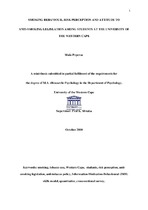Smoking behaviour, risk perception and attitude to anti-smoking legislation among students at the University of the Western Cape
Abstract
The study investigated three aspects related to smoking, namely, smoking behaviour, risk perception and attitudes to anti-smoking legislation. The theoretical framework of the study was the Information-Motivation-Behavioural (IMB) skills model. The study was a quantitative one, making use of a cross-sectional survey design to obtain data about the three variables of interest. Responses to statements about risk perception and attitudes to anti-smoking legislation in the questionnaire were arranged on a three-point Likert scale. The inferential statistics used were one-sample t-tests and Chi-square analyses. The results showed an overall smoking prevalence of 16%, with twice as many females than males being smokers in the sample. 'Coloured' students in both genders had the highest smoking rate compared to all other race groups. The knowledge of the health risks of smoking were very high, however smokers had a lower perception of risk compared to non-smokers. Moreover, while there was a fair amount of support for anti-smoking legislation among smokers, smokers tended to show less support for legislation than non-smokers, especially to those parts of the legislation that affect them more directly. The results of the study indicate a clear connection between smoking behaviour and the effect it has on both risk perception as well as attitudes to anti-smoking legislation in individuals.

